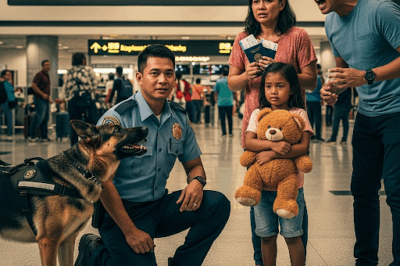
The last of the day’s heat clung stubbornly to the cracked pavement of Aguinaldo Street, a ghost of the relentless Manila sun. For Maya, it was a familiar feeling, a heavy blanket she wore along with the exhaustion that had settled deep into her bones. Her small food cart, its metal frame scarred with years of service, felt heavier than usual as she pushed it along the uneven sidewalk. The smoky, savory scent of the last few pieces of kwek-kwek and grilled isaw was a constant reminder of the day’s meager earnings, now tucked safely in a small pouch around her waist. It was enough for her grandmother’s medicine and a small bag of rice. For today, it was enough.
Maya’s world was a small one, bound by the four-block radius she pushed her cart through each day and the four thin walls of the barong-barong she called home. It was a life built on the foundations of necessity, not dreams. The dreams of finishing college, of becoming a teacher, had been packed away years ago, like old clothes that no longer fit. Now, her only ambition was the steady health of her Lola Elara, whose raspy cough seemed to echo the slow decay of their small house.
As she turned onto the final, dimly lit street leading home, the sky finally broke. Rain fell in thick, heavy sheets, instantly turning the dusty road into a murky river. Maya pulled a tattered plastic sheet over her cart, her thin shirt already soaked through. It was on nights like these that the city felt its most lonely, the flickering streetlights reflecting off the churning water, making the world seem disjointed and unreal.
That’s when she saw him.
He was slumped against the wall of a closed-down bakery, a dark shape barely distinguishable in the downpour. At first, she thought he was just another one of the city’s forgotten souls, seeking shelter. But as she drew closer, she saw the fine cut of his clothes—a designer polo shirt, now drenched and stained, and expensive-looking slacks. His head was bowed, his dark hair plastered to his forehead. He was completely still.
A knot of fear tightened in Maya’s stomach. This was Manila. Kindness was a currency few could afford, and trouble was always a bad investment. Walk away, Maya, a voice in her head, the voice of survival, whispered. It’s not your problem.
She took a few steps past him, her heart thumping against her ribs. But then, a low groan escaped his lips, a sound so full of despair it seemed to cut through the noise of the rain. She stopped. She thought of what her Lola always said: “Awa at habag, apo. Compassion and mercy. It is what separates us from the beasts.”
Turning back, she cautiously approached him. “Sir? Okay lang po kayo?” she asked softly, her voice barely audible over the storm.
There was no response. The overwhelming stench of high-end liquor hit her, and she understood. He was dead drunk, passed out in the middle of a storm. He was vulnerable. A target for anyone with bad intentions.
In that moment, the choice was made. She couldn’t just leave him there. With a sigh that seemed to carry the weight of her entire day, she parked her cart under the bakery’s small awning and crouched beside him. “Sir, you need to get up. You can’t stay here.”
She shook his shoulder, first gently, then with more force. He stirred, lifting his head just enough for her to see his face in the dim light. He was young, perhaps in his late twenties, with strong features that were currently slack and pale. His eyes fluttered open for a second, unfocused and lost, before closing again.
Getting him to his feet was a Herculean task. He was heavy, a dead weight against her small frame. She looped one of his arms over her shoulder, her own muscles screaming in protest, and half-dragged, half-carried him down the street. The journey of a hundred meters felt like a kilometer. Rain lashed at them, and the cold seeped into her bones, but she held on, driven by a stubborn empathy she didn’t fully understand.
Their home was a patchwork of corrugated iron, salvaged wood, and hope. She guided him through the narrow doorway into the single room that served as their kitchen, living room, and bedroom. Lola Elara was asleep on her mat in the corner, her breathing a soft, wheezing sound. Maya carefully lowered the man onto the family’s only plastic chair, where he immediately slumped over the small wooden table.
She stood there for a moment, catching her breath, rain and sweat dripping onto the packed-earth floor. She looked at the strange, unconscious man who now sat in the heart of her home. Who was he? What brought him to this state? She had no answers. She only had a threadbare blanket, which she draped over his shoulders, and a weary prayer that she hadn’t just made the biggest mistake of her life.
Leo Sandoval woke to the agonizing rhythm of a hammer pounding inside his skull. A sliver of morning light pierced through a crack in the wall, and he winced, shutting his eyes against the assault. He didn’t recognize the smell—a mix of damp earth, woodsmoke, and something savory, like garlic and ginger. He definitely didn’t recognize the hard, unforgiving surface of the wooden table his cheek was pressed against.
He pushed himself up, his whole body aching. He was in a small, impossibly poor room. The walls were made of mismatched planks of wood, the roof of rusting iron sheets. In one corner, a small, elderly woman with hair as white as salt lay on a sleeping mat, watching him with calm, curious eyes. Standing near a makeshift stove was a young woman, her back to him. She was slender, with long, dark hair tied back, and she was stirring a small, steaming pot.
Panic, cold and sharp, cut through the fog of his hangover. Where was he? Had he been robbed? Kidnapped? He instinctively checked his pockets. His wallet was there. His phone was there. Even his ridiculously expensive watch was still on his wrist.
“Good morning,” the old woman said, her voice surprisingly gentle. “The coffee is almost ready.”
The young woman turned around. It was the girl from… from the street? Fragments of the previous night returned to him—rain, a soft voice, the struggle of being moved. He was looking at his rescuer. She had tired eyes, but they were clear and direct, holding no malice, only a quiet weariness.
“You passed out on the street,” she said simply, her voice as soft as he remembered. “I brought you here so you wouldn’t get robbed or sick.” She ladled a thick, white porridge into a bowl. “Here. Lugaw. It’s good for a hangover.”
Leo stared at the bowl she placed in front of him. In his world, nothing was free. Every gesture had a motive, every favor a price tag. He looked from the steaming porridge to the girl’s calloused hands, then around the sparse room. These people had next to nothing, yet they were offering him, a complete stranger, their food and shelter.
“Why?” he asked, his voice hoarse.
The girl, Maya, simply shrugged. “You needed help.”
He ate the lugaw. It was warm and comforting, a simple meal that felt more nourishing than any of the gourmet food he’d consumed in his life. He watched as Maya attended to her grandmother, helping her sit up and giving her medicine with a tenderness that made something ache in his chest. He saw the bareness of their cupboards, the leak-stained ceiling, the quiet dignity with which they navigated their poverty.
After he finished, he stood up, the awkwardness of his presence filling the small space. He pulled out his wallet and took out a thick wad of bills—more money than these people probably saw in a year.
“Here,” he said, pushing the money towards her. “For your trouble.”
Maya looked at the cash, then back at him. She shook her head. “That’s not necessary, sir. We were glad to help.”
“No, I insist,” he said, his voice harder than he intended. This was how his world worked. You paid for services rendered. It was clean. It was simple. “Take it. For the food, and for your grandmother’s medicine.”
He saw a flicker of pride and hurt in her eyes, but she eventually took the money, her fingers barely brushing his. The brief contact was like an electric shock. Her skin was rough from work; his was soft from a life of privilege.
“Thank you,” she whispered, not looking at him.
He left without another word, stepping out of the dim, quiet shack and back into the chaotic symphony of the city. As his driver, Mang Ben, pulled up in the sleek, black sedan, Leo felt a profound sense of disorientation. He had just spent an hour in a world completely alien to his own, a world where kindness wasn’t a transaction. As the car pulled away, he looked back at the small, dilapidated house, a tiny island of humanity in a sea of indifference. He didn’t even know her name.
The name “Maya” was easy enough to find. A few discreet inquiries from Mang Ben in the neighborhood and Leo had all the information he needed. Maya Reyes, 22 years old, former scholarship student at a state university, dropped out to care for her grandmother, Elara Reyes. Sells street food on Aguinaldo Street. No father, mother an OFW in Dubai who hadn’t been heard from in years. Her life was a ledger of hardships.
For days, Leo couldn’t shake the image of her small, proud face as she refused his money. He went through the motions of his life—board meetings where billions of pesos were discussed, lavish dinners with business partners, empty nights in his sprawling penthouse overlooking the city. But it all felt hollow, a charade. His father, the legendary and ruthless Arturo Sandoval, had built an empire, and Leo was its unwilling king. He had inherited the throne but also the isolation that came with it.
His drinking had gotten worse since his mother’s death a year ago. She had been his anchor, the only one who saw the artist he had wanted to be before he was forced to become a CEO. The night Maya found him, he had been coming from the anniversary of his mother’s death, feeling the full weight of his gilded cage.
He thought about the lugaw. He thought about the threadbare blanket. He thought about an act of pure, unadorned kindness. It was a language he had almost forgotten.
He realized the money he’d given her was an insult. It was a payment, a way to close the book on an uncomfortable encounter. But he didn’t want the book closed. For the first time in a long time, he felt something other than numb. He felt… indebted.
Meanwhile, Maya used the money exactly as Leo had intended. She bought a month’s supply of Lola Elara’s expensive medication and ingredients for her food cart. She even managed to pay a local handyman to patch the worst of the leaks in their roof. To her, the stranger was a strange, fleeting blessing, a story she would one day tell about the time a rich, sad man stumbled into her life and left a small miracle in his wake. She never expected to see him again.
A week later, a notice was posted on a pole in their small community. The land they were living on had been sold to a developer. They were given thirty days to vacate. The news ripped through the neighborhood like a typhoon, leaving panic and despair in its wake. For Maya, it was a death sentence. They had nowhere to go. The small world she had fought so hard to maintain was about to be bulldozed.
The black sedan was an alien spacecraft in the dusty, narrow lane where Maya sold her food. People stopped and stared as a man in a perfectly tailored suit stepped out. It was the stranger. But he wasn’t the disheveled, broken man she had rescued. This man was composed, powerful, his presence commanding respect and a little bit of fear.
He walked directly to her cart. “Maya,” he said, his voice steady.
She could only stare, wiping her hands on her apron. “Sir,” she managed, her voice barely a whisper.
“My name is Leo Sandoval,” he said. “And I came to thank you properly.”
The name hung in the air between them. Sandoval. As in Sandoval Corporation, the biggest tech conglomerate in the country. The company that was on the news every night. The company that, she suddenly remembered from the gossip in the market, had just bought a huge tract of land in this district for a new commercial development.
The blood drained from her face. “You…” she started, her mind racing. “It’s your company that’s forcing us out.”
Leo’s expression fell. He looked genuinely surprised, then horrified. “What? My company is… here?” He pulled out his phone and made a frantic call. Maya could hear his voice, sharp and angry. “What project in the Tondo district? … Why wasn’t I briefed on the residential displacement? … No, I don’t care about the permits. Halt it. Halt everything. Now.”
He hung up, his face pale. He looked at Maya, his eyes filled with a deep, sincere regret. “Maya, I am so sorry. I… I had no idea. My father initiated that deal months ago. I’ve been so disconnected, I didn’t even know. Please, believe me.”
And looking at him, she did. She saw the same lost man from that rainy night, not a ruthless businessman.
“I didn’t come here for that,” he continued, his voice softer. “I came here because… you helped me. You didn’t know who I was. You had every reason to walk away, but you didn’t. You showed me a kindness I thought no longer existed. That night, I was at my lowest. You didn’t just save me from the rain, Maya. I think you saved me from completely losing myself.”
Tears pricked at Maya’s eyes. The stress of the eviction notice, the shock of his identity, the sincerity in his voice—it was all too much.
“My Lola is sick,” she said, the words tumbling out. “We have nowhere to go.”
“Yes, you do,” Leo said firmly. “Please. Let me help you. Not as payment. As a thank you. As a friend.”
Leo was true to his word. The eviction was permanently cancelled. The next day, a team of doctors, privately hired by Leo, arrived to check on Lola Elara. They diagnosed her condition properly and started her on a new treatment that, within weeks, had eased her cough and brought color back to her cheeks.
A few days later, Leo took Maya to see a small, modest but sturdy house in a quiet, safe neighborhood not far away. It had a small garden, two bedrooms, and a proper roof that didn’t leak.
“It’s yours,” he said. “And I’ve set up a trust to cover all of your Lola’s medical needs for the rest of her life.”
Maya was speechless, overwhelmed by the sheer scale of his generosity. “Leo, this is too much. I can’t accept this.”
“You’re not accepting a gift, Maya,” he explained patiently. “You’re accepting an apology and a thank you. Besides, I have another offer for you.” He told her he had learned she had to drop out of college. “The Sandoval Foundation has a scholarship program. A full ride, for any course you want. You were meant to be a teacher, weren’t you?”
This was the gift that finally broke her. The dream she had packed away so long ago, now being handed back to her. This time, the tears fell freely.
In the months that followed, a new life blossomed for Maya. She went back to school, her passion for teaching reignited. Lola Elara thrived in their new home, spending her afternoons tending to her small garden.
Leo became a constant presence in their lives. He would visit them, not as a wealthy benefactor, but as a friend. He’d share simple meals with them, listening to Lola Elara’s stories and laughing at Maya’s tales from her classes. In their quiet, humble company, the ghost of the lonely CEO began to fade, replaced by a man who was learning to smile again. He started a new division in his foundation, spearheaded by Maya, to provide micro-loans and support for street vendors like she had been. He was using his power to build, not just to profit.
One evening, as he and Maya sat on the porch of her new home, watching the sunset paint the sky in hues of orange and purple, she turned to him.
“You know,” she said. “That night, I almost walked away.”
“But you didn’t,” he said, his eyes meeting hers. “And that made all the difference.”
He was no longer the ghost on Aguinaldo Street, and she was no longer just a poor girl selling skewers on the corner. They were two people from different worlds, brought together by a rainy night and a simple act of kindness that had, in the end, saved them both.
News
Bilyunaryang CEO Hinamon ang Mahirap na Janitor Kapalit ng Kasal, Pero…
The city of Manila sprawled below Adrian Salazar’s penthouse office like a galaxy of captured stars. From the 70th floor…
ANG KUMPISAL SA LIKOD NG MGA BANAL NA PANGAKO
Ako si Daniel. Tatlumpu’t dalawang taong gulang, tatlong taon nang isang funeral worker. Para sa marami, ang trabaho ko…
BINULGAR NA! Cong. Arjo Atayde NILAGLAG ng Isang DISCAYA, Itinurong NANGIKIL din sa Milyun-milyong Halaga ng Maanumalyang Flood Control Projects! Ang Buong Katotohanan, Alamin!
Isang nakakayanig na kontrobersiya ang sumabog ngayon sa mundo ng pulitika at showbiz matapos idawit ang pangalan ni Quezon City…
Biglang Tumahol ang Service Dog nang Makita ang Isang Batang Babae Kasama ang Kanyang mga Magulang — at Doon Napansin ng Pulis ang Kakaiba Tungkol sa Bata
Isang malamig na umaga sa international airport. Ang sahig ay kumikislap mula sa kintab ng sapatos ng mga pasaherong nagmamadali….
After Five Years in the Dark, the Kapamilya Light Is Back On: ABS-CBN Announces Historic Return to Free TV
The date August 31, 2025, will forever be etched in the memory of millions of Filipinos as the day hope…
NAGSALITA NA! ELLEN ADARNA SINAPUBLIKO NA ANG BABAENG DAHILAN NG HIWALAYAN NILA NI DEREK RAMSAY!
Kumakalat ngayon ang isang nakakagulat na balita na yumanig sa mundo ng showbiz! Matapos ang ilang linggong haka-haka at…
End of content
No more pages to load












